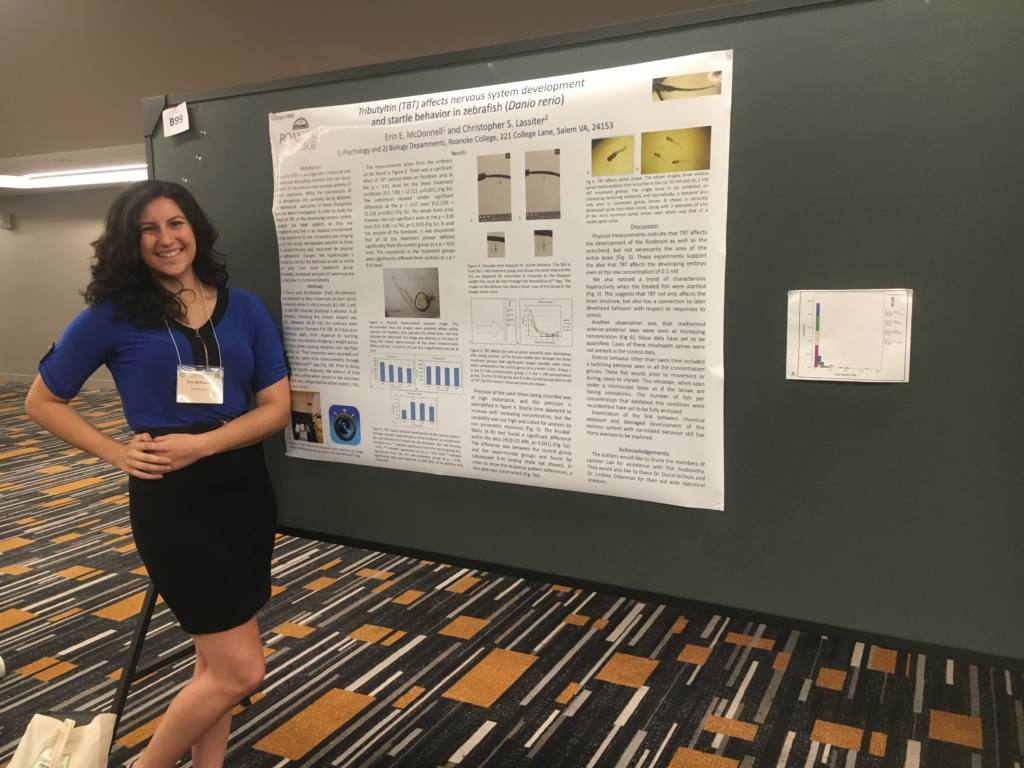Recent graduate Erin McDonnell had the opportunity to present at SDB conference with Dr. Lassiter. I had the opportunity to interview her and get her take on her conference experience.

Can you describe what your research project is about?
At its core, my research project centered around ideas of Behavioral Neuroscience and Toxicology. My experiment looked at the development of zebrafish embryos while being exposed to a chemical compound called Tributlytin (TBT). I measured brain areas of certain regions and the length of the notochord through phase contrast microscopy. Once the brain had been imaged, I let them develop further in the chemical environment to the age where they could swim and tested for a specific behavioral response. The response that I measured was how long the embryos swam around after being startled. This was done in order to establish a link between the chemical’s effects on the body as well as later developed behavioral patterns that may be extrapolated to humans.
We found that TBT does have an impact on how the brain and notochord develop as well as how larvae interact with their environment. Specifically, my research showed that exposure to this chemical, even at 0.1 nM, decreased the size of the forebrain, increased the length of the notochord and increased the amount of time the larvae stayed in a startled state. Other behavioral abnormalities were also found that offers many doors in future directions for expanding the project.
What made you decide to pursue your topic?
Ultimately, I wanted to work on a project that truly integrated both Psychology and Biology to greater explore the neurological, and I have always had a fascination with the “black box” of Psychology, the concept that the mind can only be explored in matters of influencing input and describing the output. This concept of what is going in affects what is there and changes something that is expressed was an attainable premise to build upon, and is the idea that the project centers on. Marrying that idea to another of my major interests of not knowing how certain drugs and chemicals work within living systems is how I decided to pursue the full topic of the project.
Talk about the conference experience.
The conference that I went to was the Society for Developmental Biology’s 78thannual meeting. The conference spanned a variety of developmental biology topics such as Evolutionary Biology, Epigenetics, modeling human pathologies, Regeneration and Organogenesis, and new live imaging techniques. My research was accepted for presentation during a poster session that had other neurodevelopment and related projects from all over the nation as well as a few from visiting countries. This was my first conference ever, and at first it was a tad overwhelming. Once I got into the rhythm of the conference, however, everything was incredible. I learned so much about things I had never even thought about before, all while having a great time interacting with new people and getting to see a different side of my professor. Going to a conference is yet another way to experience a field of study in a more hands on way. I got to hear from top minds in the field and people on more my level of study about the research they have done, where the field is going, and also just simply what excites them about science. It was a whirlwind experience that I think everyone that can, should have. It is also one that, no matter who you are, will gain something from it.
Why would someone be interested in your findings at a conference?
Personally, I wanted to present my findings at a conference in order to get the experience of presenting as well as network with people I would likely never have the opportunity to meet outside of that conference. It is one thing to present to a room of peers, or even colleagues, but presenting in a space filled with strangers of who most have advanced degrees and want to speak with you about your work is another. It is one that is exhilarating, at times nerve wracking, but in its entirety unique.
While I am a bit biased, my findings alone were intriguing due to the unexplored nature of the chemical I chose and what I ended up finding. I wanted to get the chance to tell other people about what I had done and found. I was looking at zebrafish and how they reacted in ways that I thought might be seen affecting humans. So not only are there developmental and purely biological implications, but one might be interested in presenting my research at a conference that focuses on health, environmental risk factors for disease or human ecological impacts. I would love to have someone take a look at the work that I have done and expand on it. My project was meant as a stepping stone that I hope a student will take up in the future.